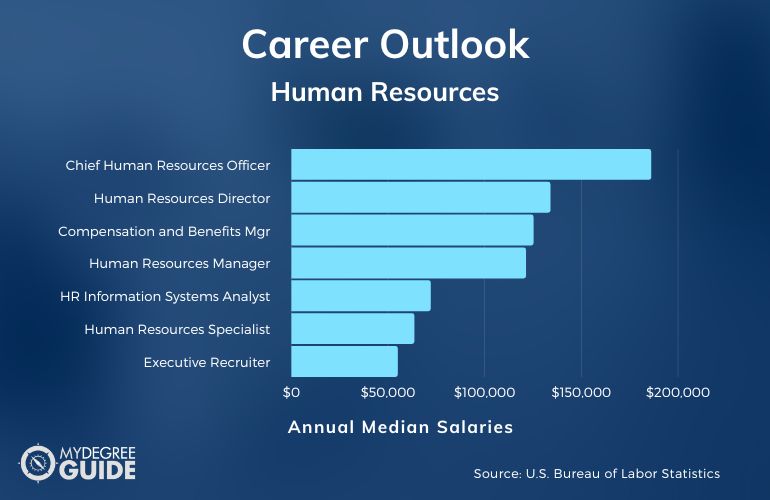What can you do with a human resources degree? Find out what you can do after graduation here!

You should have plenty of options, especially if you get educated or certified for in-demand practice areas. An HR career can take you in many different directions.
Editorial Listing ShortCode:
What Can You Do with a Human Resources Degree After You Graduate?
Once you’ve completed a bachelor’s degree in human resources online or on-campus, you’ll have two main options.
The first is entering the workforce. A four-year degree in human resources can help you qualify for many HR jobs, including recruiter, payroll administrator, staff coordinator, and human resources specialist.
Some positions might require more education or special licensure, but generally speaking, you can start a human resources career with a plain BA or BS.
The second option is staying in school and obtaining a master’s degree. You can get one in human resources, including a specialization in something like training or benefits, or you can go for a master’s degree in a related field.
For example, a Master of Business Administration (MBA) is frequently offered with a human resources concentration. These disciplines are closely intertwined in high-level positions such as HR director.
Even if it isn’t required by employers, what makes a master’s degree in human resources worth it is that it can give you an edge over other job applicants, and it can help you build your skills until you’re confident taking charge and leading a company’s HR department.
These aren’t the only paths that you can take after graduating with a human resources degree, but they’re the most common. Unless you want to try for something special like a doctorate in HR, you’ll probably go down one of these roads.
What Are Some Human Resources Jobs?

Jobs for human resources majors are available at every level of education, so your prospects will frequently depend on your degree type.
- An associate degree can help qualify you for entry-level jobs such as clerk and office assistant. You might work in payroll, employee relations, or corporate program development.
- A bachelor’s degree can help you move into more senior positions. Depending on your interests and specialties, you might become a hiring manager, benefits specialist, or human resources information systems (HRIS) analyst.
- A master’s degree isn’t always required by employers, but it can give you a leg up in your industry, and it can help prepare you for the top-earning jobs such as human resources manager or chief human resources officer.
List of Careers in Human Resources

You’ve seen the kinds of job opportunities that you’ll have after graduation. But what about their salaries?
According to the Bureau of Labor Statistics, some careers in the human resources field and their average salaries include:
- Chief Human Resources Officer ($185,950)
- Compensation and Benefits Manager ($125,130)
- Human Resources Director ($133,860)
- Human Resources Manager ($121,220)
- Human Resources Information Systems (HRIS) Analyst ($71,960)
- Executive Recruiter ($54,920)
- Human Resources Specialist ($63,490)
- Training and Development Specialist ($62,700)
- International Human Resources Associate ($54,920)
Keep in mind, however, that these are just median salaries. Human resources managers make a median of $121,220 per year, but their full range is between $71,180 and $208,000.
Why is there such a difference in pay for the same job? It’s because your salary will depend on many different factors.
What Affects a Human Resources Career Salary?

Let’s continue with the example of human resources manager. Right away, your salary will vary depending on your field. According to the Bureau of Labor Statistics, the averages for HR managers in a few different industries are:
- Professional, scientific and technical services ($138,030)
- Management of companies ($133,860)
- Manufacturing ($119,880)
- Government ($105,830)
- Healthcare and social assistance ($101,990)
Your education and experience can also play a role in your paycheck. When you’re a new manager, you’ll probably make less money and earn fewer bonuses than when you’re an experienced manager with 20 years under your belt.
Location matters as well. Human resources managers in New Jersey make on average $177,960; meanwhile, managers in Connecticut nonmetropolitan area make on average $89,560 less. Big city employees usually take home a higher salary than others, but demand has a lot to do with salary, too.
If you’re living in a place with an abundance of HR managers, you’ll probably make less than an area where HR managers are scarce and, therefore, high in demand.
To put it simply, there are a lot of factors that go into a salary, so you shouldn’t make career decisions based on median pay alone.
Professional Organizations for Those with an HR Degree

Professional organizations can offer many benefits to both students and job seekers. You aren’t required to join any, but since they can help with everything from networking to skill development, they’re usually worth it.
Academy of Human Resources Development
The Academy of Human Resources Development distributes four different academic journals devoted to HR, including Human Resource Development Quarterly and Advances in Developing Human Resources. This organization can help you stay on the cutting edge of all news, laws, trends, and statistics in the industry.
Association for Talent Development
The Association for Talent Development is for recruiters and trainers who work in human resources. They offer many different tools of the trade, including e-books, webcasts, videos, newsletters, and discounts on professional goods and services.
HR People + Strategy
Sponsored by the Society for Human Resource Management, HR People + Strategy is a wide-ranging organization with members from all across the country.
You’ll need to meet certain criteria to join, but once you’re in, you can gain access to conferences, podcasts, networking events, and academic journals.
International Association for Human Resource Information Management
The International Association for Human Resource Information Management has a hefty name, but its goal is simple: It wants to assist and educate people who work with human resources systems.
You might be particularly interested in its Human Resource Information Professional (HRIP) certification program.
National Human Resources Association
Offering everything from seminars to online job listings, the National Human Resources Association is a one-stop-shop for HR professionals. They even have a cloud-based web portal with a live chat to answer all of their members’ most pressing questions.
Society for Human Resource Management
With thousands of members, the Society for Human Resource Management is one of the largest professional organizations for HR.
They offer news, podcasts, blog posts, compliance documents, legal advice, live chats, and templates for everyday files and forms. Their resources can be quite useful for HR workers.
Certification and Licensure Following an HR Degree

Technically, you can get started in a human resources career with nothing more than an associate degree. You’ll just find that jobs are limited for those with an equally limited education. If you want a high-paying job, you should probably boost your resume with high-quality credentials.
Associate Professional in Human Resources
The Associate Professional in Human Resources (aPHR) is for entry-level professionals who are just beginning their HR careers.
You can sit for the exam even if you have zero HR experience. It’s a knowledge-based certification, so as long as you study, you can earn your spurs and get an edge over other job seekers.
Global Professional in Human Resources
The Global Professional in Human Resources (GPHR) can certify you as an expert in international business relations. The exam will test your knowledge of things like strategic HR management and global talent acquisition.
To sit for the exam, you’ll need to meet one of the following requirements:
- High school diploma and four years of HR experience
- Bachelor’s degree and three years of HR experience
- Master’s degree and two years of HR experience
As you can see, an advanced education isn’t necessary, but experience is a must.
Professional in Human Resources — International
Formerly known as the Human Resources Business Professional, the Professional in Human Resources-International (PHRi) is based on all-around competence in HR. It is designed to make sure that you’re ready for any HR challenges regardless of your geographic region.
To sit for the exam, you’ll need to meet the same requirements as the GPHR. You’ll also need to renew your certification every three years. You can either re-take the exam or submit at least 60 credits that prove your continuing education in human resources.
Senior Professional in Human Resources
Have you been working in human resources for a while? Do you want to qualify for a promotion or prove your talents as an industry leader? You might be interested in the Senior Professional in Human Resources (SPHR).
The SPHR is meant for professionals in high-level positions such as manager, director, supervisor, and department head. As such, the requirements are stricter than usual. You’ll need to meet one of the following conditions:
- High school diploma and seven years of experience
- Bachelor’s degree and five years of experience
- Master’s degree and four years of experience
The experience must be in senior human resources positions.
SHRM Certified Professional
The SHRM Certified Professional (SHRM-CP) is offered by the Society for Human Resource Management.
You’ll need to meet both education and experience requirements, especially if you worked or studied in a non-HR field, but it’s still possible to get certified even without an HR background. This makes the SHRM-CP a great qualification for people who are considering a career change.
Questions Related to Earning an Online MBA HR Degree
Here are our answers to a few more questions you might have.
What Are the Different Jobs in Human Resources?

Jobs related to human resources run the gamut from entry-level clerking positions to high-level managers who handle things like benefits, compensation, recruitment, corporate compliance, and workplace disputes.
If you pursue a career in human resources, you might become everything from a payroll administrator to a labor relations specialist.
Is HR a Good Degree?
A human resources degree can prepare you for work in a variety of fields. Its courses typically cover topics such as employment law, labor economics, business ethics, organizational behavior, and human resources strategy.
If you specialize, you may also learn about recruiting, training, or compensating employees.
Is HR a Good Career Option?
A human resources degree can be a very wise investment for the future for many. Management occupations are projected to grow 5% for the next 10 years, according to the Bureau of Labor Statistics. So there are more jobs opening every day, and the salaries of high-level positions can exceed $100,000.
Just know that you might need to obtain an advanced degree before you’re able to reach such heights.
Do Human Resources Jobs Pay Well?
Human resources jobs can pay off in a big way. While your exact salary will depend on your age, experience, education, location, and industry, you may be able to earn between $54,00 and $184,000. Certain supervisory jobs make more than $100,000 per year according to the Bureau of Labor Statistics. Some managers even crack $200,000 per year!
Is an HR Degree Worth It?

Yes, an HR degree is worth it for many students. The Bureau of Labor Statistics is projecting 5% job growth in business and financial occupations over the next 10 years. Common careers in this field include international human resources associate, training and development specialist, recruiter, HR analyst, and human resources manager.
With a faster than the average job growth, a human resources degree is one of the useful degrees that you can obtain in the current economy. Consider enrolling in a human resources degree program if you’re interested in this kind of work.
